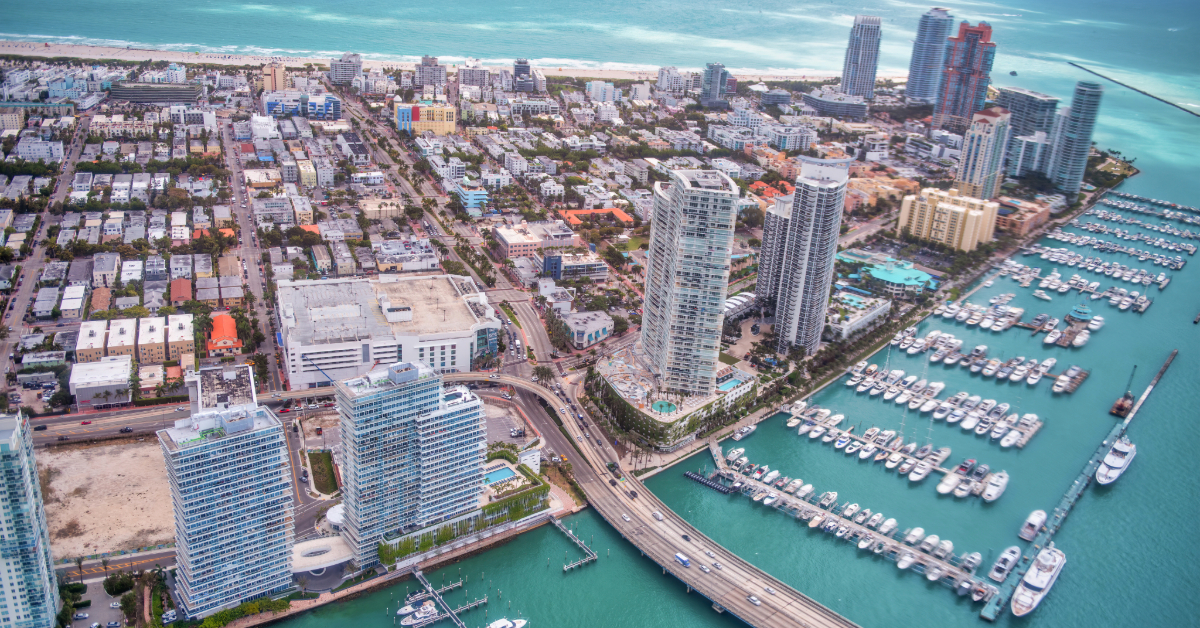Key Takeaways
- Optimize your ecommerce strategy by selecting a city that offers a unique advantage in terms of talent, logistics, and market access to stay ahead of the competition.
- Analyze the specifics of each city, including cost of living, business expenses, and infrastructure, to make an informed decision about where to establish your ecommerce brand.
- Enhance the lives of your customers and employees by choosing a city that aligns with your brand’s values, such as sustainability or community involvement, to create a positive impact.
- Discover the diverse opportunities and challenges that different cities present for ecommerce brands, from the tech ecosystem in Austin to the multicultural market in Miami, to inform your business decisions.
When planning to establish an ecommerce brand, the location you choose isn’t just a background detail—it can influence everything from hiring top talent to securing funding and connecting with thriving entrepreneurial ecosystems.
In 2025, cities across the U.S. are positioning themselves as innovation hubs, offering unique advantages for ecommerce businesses. Whether it’s the tech surge in Austin, the global gateways of Miami, or the creative support in cities like Portland, where you set up shop can directly impact growth opportunities, operational efficiency, and brand visibility.
Special thanks to Printful for their insightful research on optimal locations for brand building, which served as the foundation for this expanded analysis. Their original work provided valuable perspectives on how geography influences ecommerce success in today’s market.

Why Location Matters for Ecommerce Brands
The success of an ecommerce brand depends on more than just a standout product or a killer marketing campaign. Where you choose to establish the operational roots of your business can influence everything from talent acquisition to logistical efficiency and long-term growth. Certain U.S. cities are uniquely poised to support ecommerce innovation, providing invaluable resources and ecosystem support for brands aspiring to lead in 2025 and beyond. Let’s explore the key factors that make location a significant advantage for ecommerce brands.
Access to Talent and Workforce Development
A city’s ability to attract top talent and actively invest in workforce development is a game-changer for ecommerce brands. Austin, Texas and Miami, Florida are exemplary in this regard, offering specialized talent pools that align with the needs of ecommerce operations.
- Austin: Known as a tech hub, Austin boasts a highly educated workforce, thanks in part to institutions like the University of Texas. The city’s emphasis on blending creativity with technology has resulted in a thriving network of developers, marketers, and logistics experts. The vibrant culture also makes it easier to attract and retain professionals who prioritize work-life balance. If your brand relies on AI-driven personalization or platform optimization, Austin’s ecosystem is ideal for access to cutting-edge technical skill sets.
- Miami: Miami provides a dynamic, multicultural workforce that aligns well with global ecommerce demands. The city’s strong logistics infrastructure, paired with its status as a gateway to Latin American markets, creates unmatched opportunities for cross-border ecommerce expansion. Miami also benefits from workforce initiatives and tech-based incubators that prepare workers for the evolving ecommerce landscape.
The right location connects brands to talent pools specializing in marketing innovation, customer experience management, and supply chain advancements—essential for ecommerce growth. Learn more about strategies to scale in a competitive market with insights like those shared in 3 Ways to Grow Your Ecommerce Business.
Supportive Business Environments for Ecommerce
Cities that encourage ecommerce innovation often combine tailored business policies with access to incubators, accelerators, and a network of like-minded entrepreneurs. Portland, Oregon and Denver, Colorado stand out as prime examples of cities fostering ecommerce growth.
- Portland: Portland nurtures ecommerce through a mix of progressive business policies and collaborative ecosystems. Initiatives focused on sustainability appeal to brands catering to environmentally conscious consumers. Moreover, Portland is home to numerous accelerators that provide startups with access to capital, mentors, and early-stage support—a critical advantage for ecommerce brands navigating the challenges of scaling.
- Denver: Denver has evolved into a startup hotspot known for its pro-business regulations and robust support networks. The city offers resources like Denver Startup Week, one of the nation’s largest free entrepreneur-focused events, where ecommerce professionals can access a treasure trove of insights and partnerships. Additionally, the focus on tech-driven infrastructure makes it an attractive base for brands looking to experiment with omnichannel strategies.
Business-friendly cities empower ecommerce founders with essential resources, whether it’s connecting with other entrepreneurs, attending skill-building workshops, or benefiting from city-backed initiatives. For additional insights into common challenges and growth strategies, refer to Ecommerce Challenges And Growth Strategies For 2025.
Top US Cities to Build an Ecommerce Brand in 2025
The decision of where to base your ecommerce brand is a pivotal one. Choosing the right city can offer you access to specialized talent, logistics infrastructure, and market opportunities that align with your business ambitions. In 2025, several US cities are set to become hotspots for ecommerce brands. Let’s dive into what makes these cities exceptional hubs for growth, innovation, and expansion.
Miami, Florida: A Gateway to International Markets

Miami has long been recognized for its diverse cultural atmosphere, and in 2025, this city will remain a top choice for ecommerce businesses tapping into global markets. Positioned as a gateway to Latin America, Miami provides unmatched opportunities for brands seeking cross-border ecommerce expansion. With robust logistics and bilingual talent, your business can thrive in local and international dimensions.
The city is also becoming a magnet for tech startups, thanks to its strong entrepreneurial network and favorable tax policies. For instance, many ecommerce merchants can benefit from programs encouraging innovation and international trade. If your brand focuses on global audiences, Miami offers a launchpad to reach these consumers effectively. Looking for more inspiration from sustainable ecommerce businesses? Check out examples of successful brands prioritizing eco-conscious strategies here.
Austin, Texas: The Startup Capital

Austin continues to dominate as a hub for entrepreneurship and innovation. It’s not just the lack of state income tax that makes it appealing, but also the startup-friendly culture that attracts top-tier tech talent. Home to incubators and accelerators such as Capital Factory, Austin is an ideal place for ecommerce brands that rely on AI, data-driven systems, and tech solutions.
Moreover, the city’s collaborative atmosphere fosters creative problem-solving among business leaders. It’s no surprise that leading Shopify merchants and ecommerce platforms frequently set up shop here. Whether you seek new talent or wish to explore innovative logistics models, Austin checks every box for scalability and success.
Portland, Oregon: Sustainability Meets Creativity

Portland blends sustainability with creativity, making it a haven for ecommerce brands targeting eco-conscious customers. The city’s focus on reducing environmental impact aligns perfectly with businesses adopting sustainable practices. Home to a supportive small business community, Portland ensures that brands have access to local partnerships and resources to succeed.
In Portland, you’ll find a consumer base that appreciates environmentally friendly initiatives. This level of community engagement can help your brand differentiate itself within crowded marketplaces. If sustainability is a key value for your brand, Portland offers the ideal ecosystem to make an impact.
Atlanta, Georgia: Logistics and Rapid Shipping

When it comes to logistics, Atlanta is unmatched. With Hartsfield-Jackson Atlanta International Airport and a major railway hub, the city offers one of the most efficient networks for shipping and distribution. Ecommerce brands prioritizing fast shipping times and cost-effective logistics will find Atlanta a strategic choice.
As a business hub in the Southeast, Atlanta also provides access to skilled professionals adept in supply chain and transportation management. Whether your ecommerce operation is focused on DTC shipping or wholesale distribution, Atlanta equips you with the tools to optimize how you serve your customers. Want to explore how businesses are adapting their supply chains?
Los Angeles, California: Entertainment and Brand Recognition

Los Angeles serves as more than just the nation’s entertainment capital—it’s a branding powerhouse. With access to influencers, celebrities, and content creators, LA provides ecommerce brands with unparalleled opportunities to build visibility. Imagine launching campaigns that seamlessly blend culture and commerce, all while leveraging the reach of globally recognized talent.
In addition, Los Angeles offers a diverse and tech-savvy workforce to support everything from marketing strategies to product development. The city’s coastal location also enhances shipping opportunities for West Coast and international markets. In 2025, LA continues to reign as a top city for brands looking to amplify their appeal and reputation.
Evaluating Cities for Ecommerce Growth
Choosing the right city to establish your ecommerce brand goes beyond aesthetic appeal and cultural vibes. It involves a clear-headed evaluation of market trends, operational costs, and infrastructure support to position your business for enduring growth. As the ecommerce space continues to evolve rapidly, aligning your location choice with your business model’s requirements has become non-negotiable. Below, we’ll explore the critical factors for selecting a city that can set your brand up for long-term success in 2025.
Understanding Market Trends and Consumer Demographics
Breaking into an online market doesn’t stop at having a trendy product. Where you physically base your operations can be a mirror of understanding local and national consumer behaviors. Each city has its own unique tapestry of shopper behaviors, payment preferences, and digital habits to factor into your decision.
To start your research:
- Analyze Regional Growth: Look into cities showing consistent growth in ecommerce adoption. Diverse, affluent markets like Miami offer access to multicultural demographics that can help brands break through internationally.
- Monitor Buying Trends: Identify cities where online spending is climbing. Understanding metrics such as the average order value (AOV), product niches in demand, and shipping preferences can help you refine your branding and product strategy.
- Check Infrastructure Fit for Target Audience: If you’re targeting eco-conscious buyers, for example, cities like Portland that value sustainability would provide a competitive advantage. Read more about the influence of consumer habits in ecommerce growth in this guide.
By diving into demographic studies and local trends, you position yourself to meet customer expectations and discover untapped opportunities in niche markets. Does your brand’s vision match the kind of shoppers living and working in that region?
Considering Cost of Living and Business Expenses
Before signing any leases or hiring local talent, every founder should craft a detailed expense forecast that considers a city’s cost of doing business. High operational costs in a city like Los Angeles may be suitable for high-margin businesses but crippling for startups on a tight budget.
Some critical areas to evaluate include:
- Office and Warehouse Leasing Costs: Budget for space in areas that balance affordability with accessibility. Smaller cities may offer flexibility without compromising location advantages.
- Local and State Tax Policies: Cities in tax-friendly states like Austin, Texas, allow for reinvestment into growth strategies instead of operational costs.
- Employee Compensation Needs: Talent pools in metros such as Atlanta may be more affordable compared to tech-centric cities, yet still boast a skilled workforce.
Considering these costs upfront ensures you have a scalable financial strategy in place, avoiding unnecessary cuts that impair growth. For extra tips on keeping your overhead reflective of projected market growth, refer to this business growth strategy article.
Analyzing Infrastructure and Logistics Capabilities
In the ecommerce business, logistics is everything. It’s not just about delivering goods, but doing so quickly and cost-effectively. A city’s infrastructure, ranging from access to major freight carriers to sufficient co-warehousing spaces, can play a make-or-break role in meeting shipping promises.
Here’s what to look for in logistics capacity:
- Transportation Hubs: Many brands targeting efficient shipping and distribution select cities near major airports like Atlanta or global ports in Los Angeles.
- Co-Warehousing Opportunities: Find cities that support scalable storage solutions, enabling businesses to adapt to seasonal surges or rapid growth without incurring fixed costs.
- Metro-Specific Delivery Networks: In cities where same-day delivery is increasingly popular, such as Denver, having an optimized last-mile logistics strategy is essential.
Strong logistics ecosystems help brands fulfill customer expectations and maximize shipping profitability. Research indicates that focusing on cities with accessible transportation hubs yields savings and better customer satisfaction outcomes. Explore the integration of supply chain planning for ecommerce markets in this logistics-focused report.
Strategically assessing these criteria will help you pinpoint the perfect launchpad for your ecommerce dream. With cities playing a larger role in supporting digital commerce growth, your location can work as a silent partner, ready to unlock your brand’s broader reach.
Summary
As ecommerce continues to evolve, the location of an ecommerce business has become a critical factor in its success. Cities like Miami, Austin, and Portland offer unique advantages in terms of talent, logistics, and market opportunities, making them attractive hubs for ecommerce founders and marketers. By understanding the importance of location and carefully evaluating factors such as access to talent, logistics infrastructure, and business expenses, ecommerce businesses can make informed decisions and set themselves up for growth and success.
The right location can provide ecommerce businesses with a competitive edge, allowing them to access specialized talent, develop efficient logistics systems, and reach new markets. For instance, cities with strong tech ecosystems like Austin can provide access to skilled professionals with expertise in AI, data-driven systems, and tech solutions. On the other hand, cities like Portland, with their focus on sustainability, can appeal to eco-conscious consumers and provide a unique selling proposition.
To implement these insights in real-world scenarios, ecommerce founders and marketers should start by researching local market trends and consumer behavior, building relationships with local suppliers and partners, and developing a comprehensive marketing strategy that considers the unique characteristics of the local market. They should also consider factors such as cost of living, quality of life, and access to education and training opportunities when evaluating potential locations.
By taking a strategic approach to location, ecommerce businesses can drive growth, innovation, and customer engagement. As the ecommerce landscape continues to evolve, it’s essential for founders and marketers to stay up-to-date with the latest trends and developments, and to be willing to adapt and pivot as needed. For those looking to learn more, additional resources such as industry reports, webinars, and online courses can provide valuable insights and guidance. By applying the insights and advice outlined in this post, ecommerce businesses can unlock new opportunities, overcome challenges, and achieve long-term success in an increasingly competitive market.
Frequently Asked Questions
What are the key factors to consider when choosing a city to establish an ecommerce brand?
When selecting a city to establish an ecommerce brand, it’s essential to consider factors such as access to talent, logistics infrastructure, market opportunities, and business expenses. These factors can significantly impact the growth and success of an ecommerce business, and cities like Miami, Austin, and Portland offer unique advantages in these areas. By carefully evaluating these factors, ecommerce entrepreneurs can make informed decisions and set their businesses up for success.
How does the location of an ecommerce business impact its ability to attract and retain top talent?
The location of an ecommerce business can significantly impact its ability to attract and retain top talent, as cities with strong tech ecosystems and entrepreneurial networks tend to attract highly skilled professionals. Cities like Austin and Miami, with their vibrant cultures and emphasis on innovation, can provide ecommerce businesses with access to a talented workforce. Additionally, factors such as cost of living, quality of life, and access to education and training opportunities can also influence an ecommerce business’s ability to attract and retain top talent.
What are some common misconceptions about the importance of location for ecommerce businesses?
One common misconception about the importance of location for ecommerce businesses is that it doesn’t matter where a business is located, as long as it has a strong online presence. However, the location of an ecommerce business can have a significant impact on its ability to access talent, logistics infrastructure, and market opportunities, and can ultimately affect its bottom line. By understanding the importance of location, ecommerce entrepreneurs can make informed decisions and avoid common pitfalls.
How can ecommerce businesses balance the need for a strong online presence with the importance of a physical location?
Ecommerce businesses can balance the need for a strong online presence with the importance of a physical location by carefully evaluating their business needs and goals. While a strong online presence is essential for reaching customers and driving sales, a physical location can provide access to talent, logistics infrastructure, and market opportunities that can help drive growth and success. By understanding the importance of both online and offline presence, ecommerce businesses can develop a comprehensive strategy that meets their unique needs and goals.
What role does sustainability play in the decision-making process for ecommerce businesses when choosing a city to establish operations?
Sustainability can play a significant role in the decision-making process for ecommerce businesses when choosing a city to establish operations, as cities with strong environmental initiatives and sustainable practices can provide a competitive advantage. Ecommerce businesses that prioritize sustainability can benefit from locations like Portland, which offers a culture of environmental responsibility and a customer base that values eco-friendly practices. By considering sustainability in their decision-making process, ecommerce businesses can reduce their environmental impact and appeal to customers who share their values.
How can ecommerce businesses take advantage of local resources and networks to drive growth and innovation?
Ecommerce businesses can take advantage of local resources and networks to drive growth and innovation by engaging with local entrepreneurial ecosystems, attending industry events, and partnering with other businesses and organizations. Cities like Denver and Los Angeles offer a wealth of resources and networks that can help ecommerce businesses access funding, talent, and expertise, and can provide opportunities for collaboration and knowledge-sharing. By leveraging these resources and networks, ecommerce businesses can drive growth and innovation and stay ahead of the competition.
What are some practical steps that ecommerce businesses can take to establish a strong presence in a new city?
Ecommerce businesses can take practical steps to establish a strong presence in a new city by researching local market trends and consumer behavior, building relationships with local suppliers and partners, and developing a comprehensive marketing strategy that considers the unique characteristics of the local market. Additionally, ecommerce businesses can benefit from working with local experts and advisors who can provide valuable insights and guidance on navigating the local business environment. By taking these practical steps, ecommerce businesses can establish a strong presence in a new city and drive growth and success.
How can ecommerce businesses measure the success of their location-based strategies and make data-driven decisions?
Ecommerce businesses can measure the success of their location-based strategies and make data-driven decisions by tracking key performance indicators (KPIs) such as sales growth, customer acquisition costs, and supply chain efficiency. By analyzing data on these KPIs, ecommerce businesses can identify areas for improvement and make informed decisions about future investments and strategy. Additionally, ecommerce businesses can benefit from using data analytics tools and techniques to gain insights into local market trends and consumer behavior, and to identify opportunities for growth and innovation.
What are some potential challenges that ecommerce businesses may face when establishing operations in a new city, and how can they overcome them?
Ecommerce businesses may face challenges such as navigating local regulations and laws, finding and retaining talent, and establishing a strong supply chain when establishing operations in a new city. To overcome these challenges, ecommerce businesses can benefit from working with local experts and advisors, building relationships with local suppliers and partners, and developing a comprehensive strategy that considers the unique characteristics of the local market. By being aware of these potential challenges and taking proactive steps to address them, ecommerce businesses can establish a strong presence in a new city and drive growth and success.
How can ecommerce businesses stay up-to-date with the latest trends and developments in the ecommerce industry, and what role does location play in this process?
Ecommerce businesses can stay up-to-date with the latest trends and developments in the ecommerce industry by attending industry events, participating in online forums and communities, and following industry leaders and experts on social media. Location can play a significant role in this process, as cities with strong entrepreneurial ecosystems and industry hubs can provide access to valuable networks and resources. By staying informed about the latest trends and developments, ecommerce businesses can stay ahead of the competition and drive growth and innovation, and location can be a key factor in this process.




